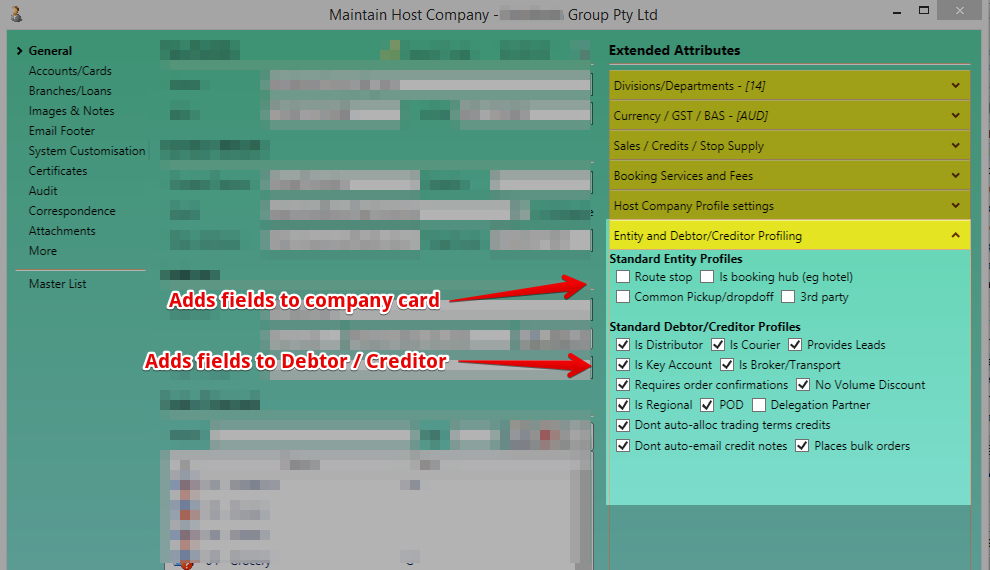| Table of Contents |
|---|
...
- Route Stop - used to indicate this business is one that a route (eg bus route) picks up or drops off at
- Booking Hub - Indicates an organisation that may take bookings on your behalf
- Common Pickup/Dropoff - does not require a booking in order for the vehicle to stop
- 3rd Party - Not directly related to your business - an entity that you may contact eg tradesperson or worksite
- Subscribe to Periodic Emails - adds a checkbox on person and company. Enables export of subscribed list to be used in external mass email tool
Standard Debtor / Creditor Profiles
- Is distributor - allows forecasting to remove from sales projections
- Is Courier - indicates this organisation will be in the list of couriers
- Provides Leads - will be in the list of leads to enable reporting about the leads they provide
- Is key Account - key accounts never get put on stop supply,
- is Broker / Transport - will be in the list of transport entities tracked on purchase orders
- Requires order confirmation - Orders will go on hold and need to be released - Stop Supply (also known as Credit Hold) and Sales Order Hold Status
- No Volume Discount - removes ability to get price list volume discount auto applied
- Regional
- POD - IF proof of delivery will be required on sales orders
- Delegation Partner - The entities that work can be delegated to (Jobs or Orders)
- Do not auto-allocate trading term credits - where trading terms result in a credit some organisations like to specify where the credit is to be applied
- Do not auto-email credit notes - when a debtor has "auto email Invoices" ticked - then selecting this will NOT also auto email credit notes
- Places Bulk Orders - orders to be removed from forecasting projectionsSubscribe to Periodic Emails - adds a checkbox on person and company. Enables export of subscribed list to be used in external mass email tool
Misc
- Misc creditors code - where an transaction does not have a know creditor
- Expenses creditor entry - a general creditor for expenses with no known creditor
- Booking / Franchise prefix - used to prefix bookings / order numbers when a franchise network exists
- Normal opening and closing time - used to default start times / end times
- Default warehouse - used after checking customer, sales rep, person entering order default warehouses
- External Reference - used were an external system has a code to indicate the ABN it is dealing with
- Standard delivery charge - default where no other delivery calculation is found
- CC payments - the service used to charge for credit card use to customer
...
- Print templates
- A print template defines the layout of the report generated for a journal type.
- The print template must be built by an our developer before it can be assigned to a journal type.
Print templates can be attached to emails that are sent from the system - see Entering Email Templates
Info When the system is looking for a report to use it looks in the following order:
- The report name (eg invoice.mrt) prefixed by the search code of the host company, eg SOULFRESinvoice.mrt or KARMAinvoice.mrt
- The report name prefixed by the host company Report Prefix, eg SFinvoice.mrt
- The report name with no prefix, eg invoice.mrt
- Journal Type
- The type of journal that the template applies to.
- Description ::A description of the use of the template.
- Template ::The file name of the print template. This will be provided by the our developer.
- Trigger Account ::is the account that will trigger the email to be sent
- The type of journal that the template applies to.
...
